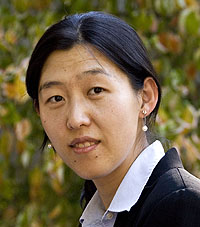Yi Zuo, assistant professor of molecular, cell, and developmental biology at UC Santa Cruz, has been awarded a three-year grant for $200,000 from the Dana Foundation's Brain and Immuno-Imaging Program. Zuo will use the funds for a research project that employs cellular imaging techniques to explore changes in the brain after a stroke and during rehabilitation.
A stroke disrupts the blood supply to part of the brain. In just one minute, the disruption can destroy about 14 billion brain synapses--the specialized junctions through which nerve cells communicate with each other and with other cell types. After a stroke, the brain undergoes reorganization, but little is known about the nature and timing of the synapse remodeling that occurs during this brief period of recovery.
Zuo's lab uses mouse models to study the structural changes and functional declines that occur in the nervous system as a result of normal aging and neurodegenerative disease. The Dana Foundation grant will fund research using fluorescent two-photon microscopy to repeatedly (over days and months) view the nerve cells and synapses in mice after strokes have been induced in the sensorimotor cortex.
Zuo and her research team will also image the reformation of synapses as the mice receive limb training and an enzyme called chondroitinase ABC. In this way, Zuo will test her hypothesis that persistent training of affected limbs can stabilize newly formed synapses, while the enzyme reduces scarring and optimizes motor recovery.
"The research should help to guide new approaches for maximizing stroke rehabilitation outcomes in patients," she said.
In addition to the Dana Foundation, Zuo's work has attracted support in the past year from several other foundations. These include the Ellison Medical Foundation, the American Federation for Aging Research, and the Alfred P. Sloan Foundation (see earlier stories here and here).
The Dana Foundation is a private philanthropy that offers science and health grants to support brain research in neuroscience and immunology and their interrelationship in human health and disease.



